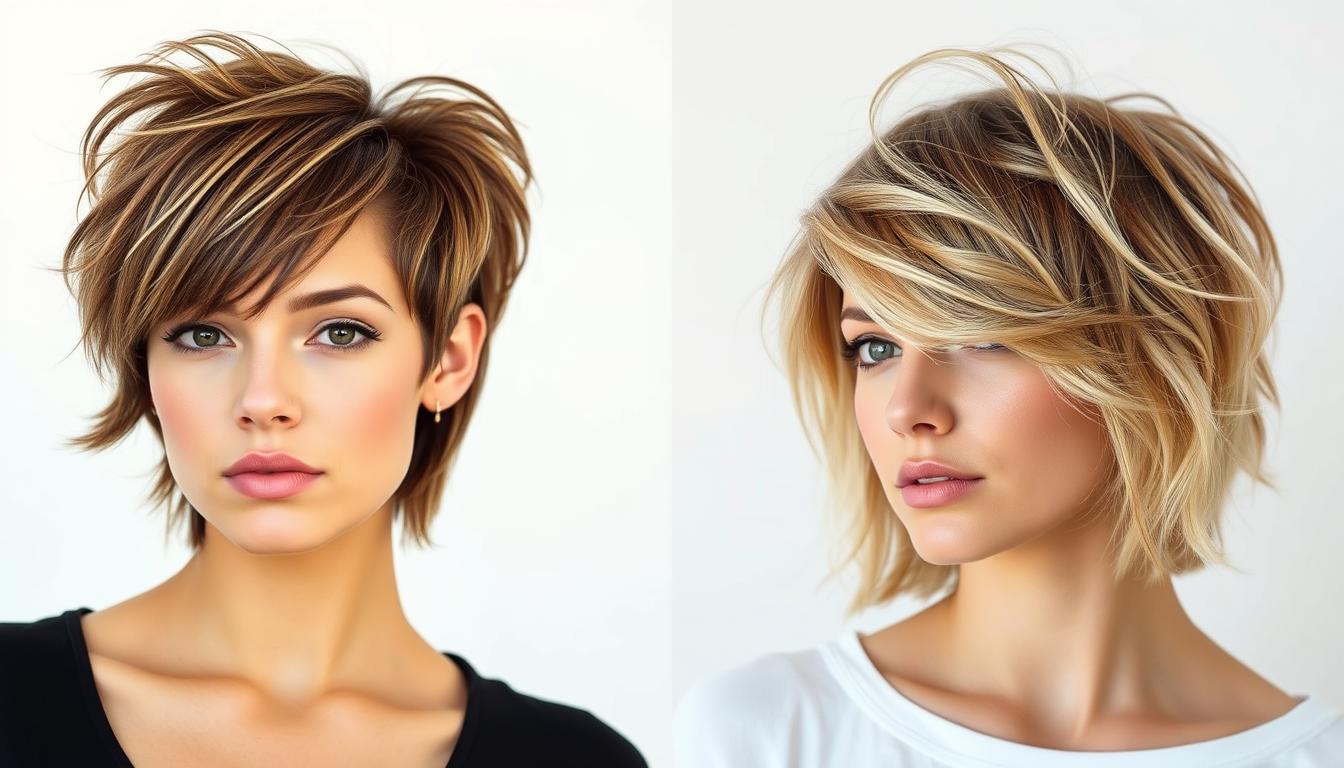
What if your next hairstyle could instantly redefine your confidence? As social media explodes with bold, face-framing looks, two retro-inspired trends dominate the conversation. But which one truly complements your unique personality and features?
These layered styles aren’t just about aesthetics—they’re cultural time capsules. One channels gritty 1970s rock energy, while the other whispers 1990s supermodel elegance. Your face shape, hair texture, and daily routine all play crucial roles in this style showdown.
From TikTok transformations to red-carpet moments, these looks work magic on trendy toddler styles through adult fashionistas. But achieving that perfect balance between edgy and effortless requires insider knowledge. We’ll break down everything from wash-day routines to styling hacks that keep your look fresh.
Key Takeaways
- Face shape and hair texture determine which layered style enhances your natural beauty
- 70s-inspired looks offer rocker-chic volume while 90s revival styles create soft, face-framing movement
- Styling time varies significantly between these two trending options
- Celebrity adaptations prove both cuts work across hair types when properly customized
- Maintenance routines differ based on layer placement and texture requirements
Introduction to Trendy Layered Haircuts
Layered styles are rewriting beauty rules with their time-tested versatility. From Studio 54 disco nights to Y2K red carpets, these designs keep evolving while staying rooted in iconic eras. Today’s versions blend retro charm with modern practicality—a perfect match for fast-paced lifestyles.
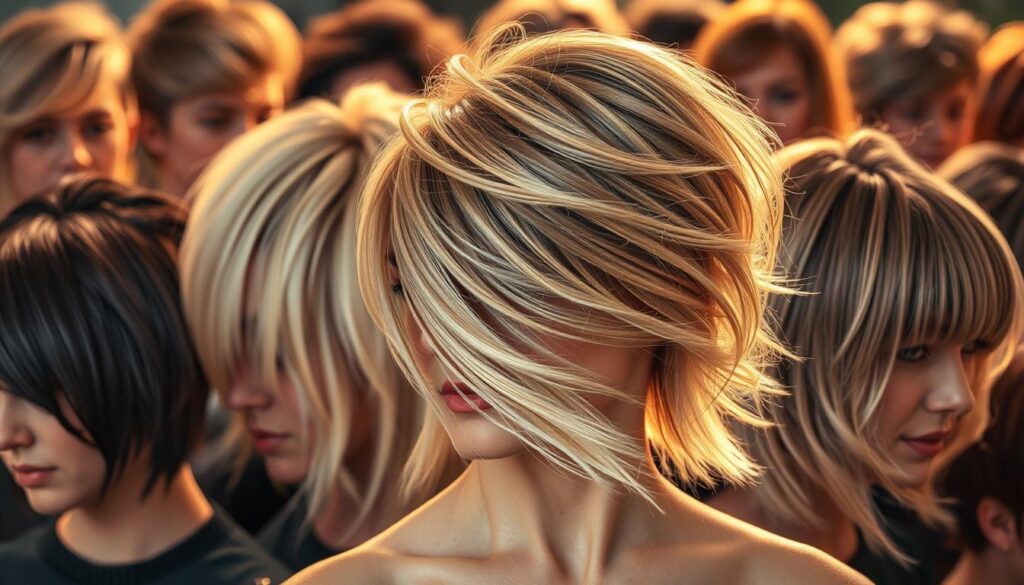
Historical Inspirations and Modern Trends
The 1970s brought us shaggy layers that screamed rock ’n’ roll freedom. Fast-forward five decades, and that rebellious spirit lives in textured, lived-in looks. Meanwhile, the 90s gifted us face-framing layers that made supermodels iconic—think windblown magazine covers and glossy runway moments.
Celebrity stylists like Sunnie Brook have reimagined these classics for TikTok audiences. “Layered hairstyles let people express multiple sides of themselves,” she notes. This revival isn’t just nostalgia—it’s about adapting vintage magic to today’s desire for low-effort glam.
Why These Cuts Are Trending Now
Social media fuels the fire, with tutorials making salon-quality styling accessible. The hashtag #LayeredHair alone boasts billions of views, proving people crave movement and dimension without daily heat damage. Modern versions work wonders on all hair types, from pin-straight to coiled textures.
Busy lifestyles also play a role. As one stylist puts it: “Clients want haircuts that air-dry beautifully but still turn heads.” This explains why modern mullet variations and soft, cascading layers dominate Pinterest boards—they’re stylishly practical.
The trend reflects a cultural shift toward authenticity. Perfectly polished looks? Out. Effortless, I-woke-up-like-this vibes? In. Layered designs deliver that coveted balance—bold enough for Instagram, easy enough for school drop-offs.
What is the Wolf Cut?
Reviving the spirit of 70s rock with a modern twist, this rebellious hairstyle turns heads through strategic chaos. Its magic lies in balancing structured layers with intentional disarray—a perfect storm of retro charm and contemporary edge.
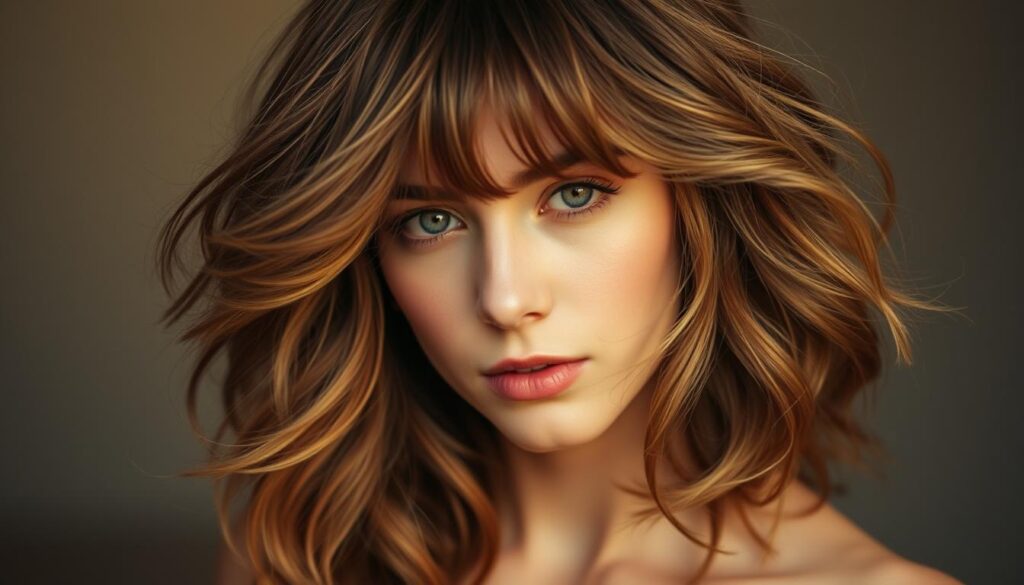
Key Features and Origins
Born from the marriage of shaggy 1970s texture and mullet-inspired proportions, this look features jagged layers that create volume at the crown. Shorter pieces around the face gradually melt into longer, choppier sections toward the neck. Stylists often use razor-cutting techniques to achieve that signature “lived-in” texture.
The style thrives on contrast. “It’s about controlled wildness,” explains celebrity groomer Lisa Farr. “You get face-framing definition up front with a cascading effect in back.” This duality makes it ideal for adding movement to straight or wavy hair types.
Styling Tips and Maintenance
Embrace the bedhead aesthetic with these easy steps:
- Scrunch damp hair with texturizing spray
- Air-dry or use a diffuser on low heat
- Finish with a dime-sized amount of matte paste
| Feature | Benefit | Time Saved Weekly |
|---|---|---|
| Choppy layers | Adds instant volume | 45 mins styling |
| Razor-cut ends | Reduces frizz | 30 mins blowouts |
| Textured crown | Hides roots | 2 hrs between washes |
With minimal product needs and forgiving grow-out phases, this cut works for those craving bold style without salon-frequency trims. Just remember: the messier it looks, the better it works.
Exploring the Butterfly Cut
Imagine hair that dances with every step, creating soft silhouettes reminiscent of delicate wings in motion. This butterfly cut combines strategic layering with feather-light ends, offering a modern take on 90s elegance. Its magic lies in shorter crown layers that cascade into longer lengths, mimicking the graceful arc of butterfly wings.
Design Elements and Layering Technique
Stylists use a feathered cutting method to create wispy ends that frame the face. Unlike choppier styles, these blended layers maintain smooth transitions from top to bottom. The technique adds movement without sacrificing length, making it ideal for those wanting dimension without dramatic shortening.
Benefits for Various Hair Types
This versatile design adapts beautifully to straight, wavy, or curly hair. For fine textures, the layered structure lifts roots for instant fullness. Thick-haired clients enjoy reduced bulk through strategic thinning. Celebrity stylist Jenna Lee notes: “We adjust layer density based on curl patterns—tighter coils get wider spacing to prevent frizz.”
At-Home Styling and Care
Maintain your look with these tips:
- Blow-dry with a round brush to emphasize face-framing layers
- Use lightweight mousse for hold without stiffness
- Schedule trims every 6-8 weeks to preserve the cut’s shape
Volumizing sprays work wonders for fine hair, while curl creams enhance natural texture. Nighttime braiding protects longer layers from tangling, ensuring morning-ready styles with minimal effort.
wolf cut vs butterfly cut: A Detailed Comparison
Choosing between two iconic styles comes down to understanding their unique approaches to shaping your look. Let’s explore how these designs transform hair through distinct layering techniques and visual effects.
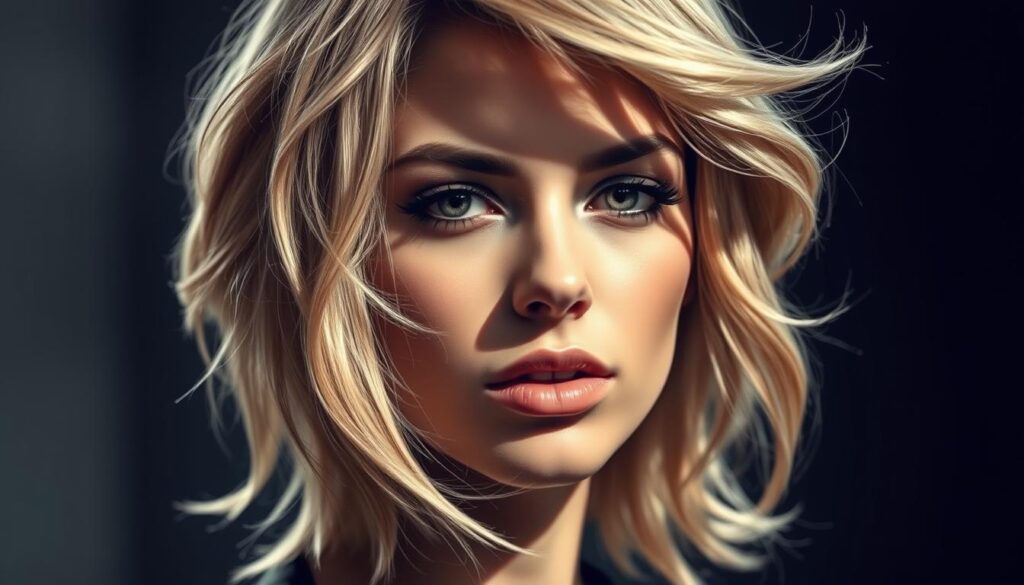
Face Shape Suitability and Impact
The right style enhances your natural features. Round and oval faces shine with face-hugging layers that add angles. Heart-shaped or square jawlines benefit from soft, cascading ends that balance sharp contours.
| Feature | Wolf Cut | Butterfly Cut |
|---|---|---|
| Layering Focus | Face-framing | Crown volume |
| Texture | Choppy edges | Feathered ends |
| Face Shape Suitability | Round/Oval | Universal |
| Volume Method | Razor-cut layers | Blended graduation |
| Aesthetic | Edgy texture | Romantic flow |
Contrast in Styling and Volume
One style thrives on messy texture, while the other demands smooth movement. The wolf’s lived-in vibe works with minimal product—just scrunch and go. Butterfly styles often need blowouts to showcase their signature flutter.
Volume creation differs radically. Jagged layers lift roots for instant body in shorter styles. Longer designs build fullness through graduated layers that swing with each step. Your daily routine decides which approach fits best.
Matching Your Face Shape and Personal Style
Your bone structure holds the secret to unlocking your most flattering hairstyle. Measure forehead width, cheekbone span, and jawline length to reveal your true face shape. Oval types enjoy balanced proportions, while heart-shaped faces showcase wider foreheads tapering to narrow chins.
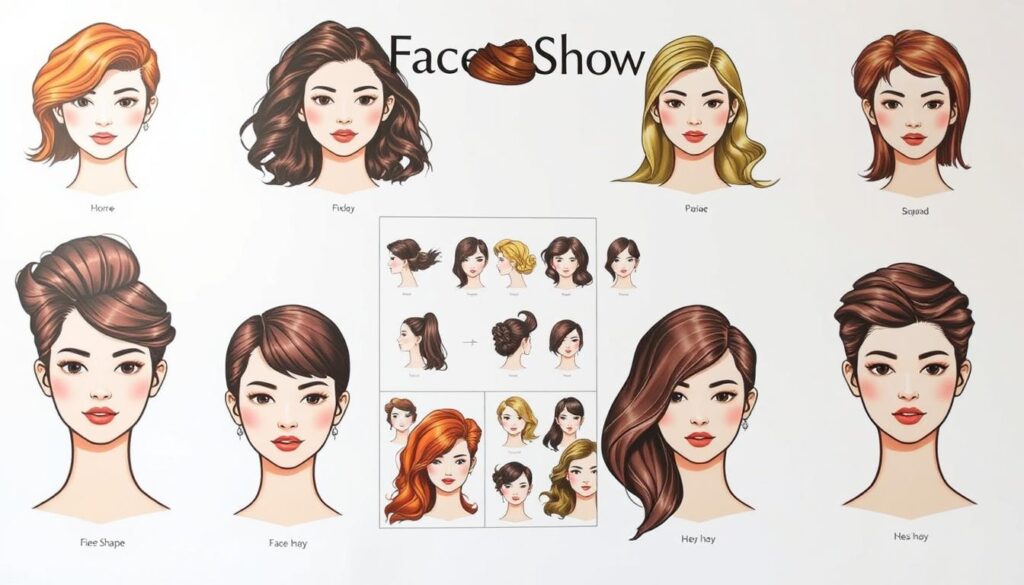
Frame Your Features Right
Round and oval faces thrive with shorter layers that create angles. The wolf cut’s textured crown adds height, visually elongating circular shapes. Side-swept bangs work magic here—they carve cheekbone definition like nature’s contour stick.
Softening Strong Angles
Square jaws and heart-shaped features demand feather-light layers. Butterfly cuts excel here, their wispy ends blurring sharp lines. Curtain bangs balance wide foreheads, while wispy fringes soften angular jawlines. For those wanting boldness without harshness, consider a choppy pixie cut variation with face-framing pieces.
| Face Shape | Ideal Cut | Key Benefit |
|---|---|---|
| Round/Oval | Wolf Cut | Adds vertical dimension |
| Square | Butterfly Cut | Softens jawline |
| Heart | Butterfly Cut | Balances forehead |
| Oval | Both | Enhances symmetry |
Your personal style completes the equation. Edgy rebels gravitate toward wolf cuts’ rocker vibes, while romantic souls prefer butterfly layers’ ethereal flow. Remember: the best hairstyle reflects both your bone structure and personality.
Styling and Maintenance Tips at Home
Transform your bathroom into a salon-worthy studio with these professional secrets. The right tools and techniques make all the difference in maintaining your look’s volume and shape between appointments.
Essential Tools and Products
Build your styling arsenal with these must-haves:
- Large round brush (1.5-2″ diameter) for root lift
- Blow dryer with concentrator nozzle
- Velcro rollers in multiple sizes
- Matte-finish texturizing spray
Invest in volumizing shampoo and conditioner to maintain body. The AMPLIFY line works wonders for fine to medium textures, while sulfate-free formulas protect colored ends.
Techniques for a Salon-Fresh Finish
Master these steps for perfect results:
- Apply heat protectant to damp hair
- Blow-dry sections upward with a round brush
- Roll top layers in Velcro rollers while warm
For air-dried styles, scrunch ends with sea salt spray. Touch up face-framing pieces with a flat iron set to 300°F. Finish with flexible-hold hairspray to lock in movement.
Schedule trims every 6-8 weeks to prevent split ends. Use dry shampoo at the roots between washes to extend style longevity. Nighttime braiding preserves waves while you sleep.
Celebrity Influence and Social Media Trends
Digital platforms have become modern beauty’s ultimate trendsetters. When Sunnie Brook crafted the butterfly haircut for clients like Jenna Ortega, she didn’t just style hair—she launched a movement. This design’s wispy layers and airy texture quickly soared across TikTok, racking up 1.1 billion views as users recreated its ethereal charm.
How Digital Platforms Shape Beauty Standards
TikTok’s algorithm transformed niche styles into global sensations. The #hairtok community dissected every angle of the butterfly cut, from styling hacks to DIY trims. Beauty influencers amplified its reach, demonstrating how face-framing layers flatter diverse face shapes and textures.
Jennifer Aniston’s 2024 Golden Globes appearance reignited interest in 90s-inspired styles. Her revived ‘Rachel’ cut became a cultural bridge, connecting nostalgic elegance with modern butterfly variations. Social metrics reveal Gen Z favors bold experimentation, while millennials lean toward softer, wearable looks.
Celebrity stylists predict these trends will evolve with augmented reality filters and AI-powered consultations. As Brook notes: “Today’s clients want looks that translate flawlessly from screens to real life.” The next wave? Hybrid cuts blending vintage inspiration with tech-driven personalization.
Conclusion
Your perfect style adventure starts with understanding what makes you shine. Edgy textured layers bring bold personality to life, while soft feathered ends whisper romantic elegance. Both designs celebrate movement, but their magic lies in how they complement your unique features.
Face shape and hair type guide the decision-making process. Oval and round features pop with dimension-adding layers at the crown. Angular jawlines soften through cascading ends that frame face contours beautifully.
Maintenance preferences matter just as much as aesthetics. Those craving low-effort styling might lean toward lived-in textures. Fans of polished looks may prefer designs requiring regular blowouts.
Consult a skilled stylist to customize either trend. They’ll adjust layer density and length based on your hair’s thickness and natural wave pattern. This personalization ensures your chosen style enhances rather than overwhelms.
Today’s beauty standards embrace individuality through adaptable cuts. Whether you choose dynamic texture or flowing movement, both options deliver modern flair. Your ideal look awaits where personal expression meets expert craftsmanship.
